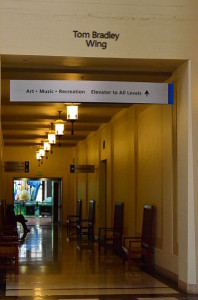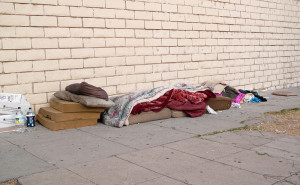Hidden Cash in the Los Angeles Downtown Library Fails to Cause A Stir
ADAM MICHAEL LUEBKE
Los Angeles
Reportedly, swarms of people descended on the Huntington Library lot to look for a hidden envelope of cash. The excitement has been building for days as an anonymous benefactor behind the Twitter handle @HiddenCash started planting the envelopes around the Bay Area. He brought his antics down to SoCal, where the people have been titillated over discovering the hidden money.
The @HiddenCash man claims to be a wealthy real estate developer who closed a big deal recently, and he wanted to share the good fortune with random people, as well as spark thoughts of generosity in the minds of the general public.
 I too was inspired by the man behind the cash. I did not search for the money, as I am quite content with my level of poverty, but I did want to extend that same level of generosity in my own way. Recently, I too had a windfall as the website Yahoo! Voices paid me $7.02 for my review of Dr Kelly A Turner’s book Radical Remission. What if I could spread out those seven bucks to do some good, I thought? Would people clamor for the free cash?
I too was inspired by the man behind the cash. I did not search for the money, as I am quite content with my level of poverty, but I did want to extend that same level of generosity in my own way. Recently, I too had a windfall as the website Yahoo! Voices paid me $7.02 for my review of Dr Kelly A Turner’s book Radical Remission. What if I could spread out those seven bucks to do some good, I thought? Would people clamor for the free cash?
With my seven dollars burning in my pocket, I rode the Metro purple line train to the central Los Angeles library location downtown. If I could incite the passions of the people to find cash in random places, perhaps I could instill in them at the same time the desire to learn about serious, but much misunderstood subjects in our American society. I will tie the lust for free cash with the need for knowledge, I thought, by planting each of my seven one-dollar bills in a meaningful book throughout the library.
I sought out the lesser used areas of the science and technology department. To the light snores of a homeless man crouched in the dimly lit corner of the stacks, I planted my first dollar in Ayurveda: the ancient Indian medical system, focusing on the prevention of disease through diet, lifestyle and herbalism.
Find the dollar in here! I thought, and get your socks blown off by this incredible information. I chose the most salient point of the second chapter in which to hide my dollar.
The second dollar I took to a different section of the library. To the goddamned history department. I lifted from the stacks the fattest book I could find, and was not surprised to see it was Carroll Quigley’s 1966 edition of Tragedy & Hope. Quigley had been an esteemed historian at Georgetown University. When the Council on Foreign Relations (CFR) asked him to read through their papers and write a detailed history of Western Civilization with the knowledge, he did.
If Ecclesiastes 9:10 gives us this principle, “Whatsoever thy hand findeth to do, do it with all thy might,” then Quigley embodied that as he hammered out 1308 pages of modified Western history according to those who know it and manipulate it best, the CFR. Quigley’s book was not supposed to be for mass consumption, but rather for other noteworthy academics like himself that would be interested in furthering the goals of the CFR, but the Georgetown historian was delighted when his book sold out and became an underground classic.
Quigley fought for the rest of his life to get Tragedy & Hope reprinted. Much to his dismay, his publisher did not realize the sensitive information Quigley had put into the book, and claimed there was not enough demand for a reprint. Eventually, the book was reprinted, but without the sections on the secretive, Rothschild created Bank of World Settlements.
Watch John Taylor Gatto talk about “what Carroll Quigley did that was so remarkable” (start at 3.58):
The third dollar I might or might not have tucked into the back end of a gem of a book called Jesus Was a Mushroom. You figure it out.
A CHEAP BRIDGE BETWEEN THE HOMELESS & THE HIPSTERS (A Four Dollar Solution)
With three one-dollar bills burning holes inside books holding intense knowledge, I figured my mission was finished in the Los Angeles library. Once I’d announce the ploy on Twitter, I imagined thousands of people would flood the central library and get caught up in unearthing the finer pursuit of knowledge, rather than fiat government currency. (I would quite disappointed, though, as of this update nobody has responded to the hidden cash drop, nor has the central library complained of a sudden, unexpected maximum capacity event.)

Can you spot the one dollar bill?
With my last four dollars I caught a bus down to Temple Street. My location was handpicked from a recent news article I’d read about a wealthy developer pushing to construct an elevated pedestrian walkway to allow his tenants to circumvent the troubled area under the 110 freeway underpass.
What better way to compel the general public and nearby LA foodies and hipsters to interact with the ballooning downtown homeless population than stuff a few one-dollar bills beneath the unattended shopping carts that are filled with the most random of objects, like one torn up tennis shoe, half a burrito, and a VHS copy of Homeward Bound.
Imagine the excitement when a bearded computer programmer wearing Ray Bans and yanking on a leash that restrains a fraught, snarling Yorkie, notices the familiar green and white edge of a dollar bill peeking out from under a soiled sleeping bag. He might dare pluck it from under the fabric and strike up a conversation with the half-dazed man who’s half sleeping, half daydreaming while holds a dented can of Temecula heavy.
Ideally, through the love of greed and free money, self-education and community building should only cost a few bucks.
[LA library hallway, photo by Mquach; homeless bed LA photo by Downtowngal]




nice thanks for the thoughts everyone should be seeking to gain more knowledge wheteher o not money is involved…I misght cheeck out those books on my kindle to see if I can learn something to
You can find Quigley’s Tragedy & Hope (with its pages 62-3 censored, though) online in a PDF version here: http://www.carrollquigley.net/pdf/Tragedy_and_Hope.pdf
It’s quite good to patiently flip through. Certainly not a breezy summer read, but loaded with insight and knowledge.
Thank you for the comment.
Thanks I will check it out. I’m not one to shy away from something simply because it’s not a breezy summer read.
The only reason I said that about a summer’s read is because I once had a wonderful professor who would say, “Folks, this probably isn’t something you’re going to want to pick up and read on your summer vacation!” about challenging literature, like a lengthy William Wordsworth preface to his poetry collection. The professor, apart from being a Shakespeare fanatic, adored an endless stack of steamy romance novels during those summer months.
So, Tragedy & Hope could ruin a person’s literary summer endeavors, unless that is the kind of intensity one is seeking.
There was a fair lass from LA
Who sought ready cash in this way
But when hunting for loot
Her crave did uproot
And the books became treasure that day
It’s like Chaucer dusted off his lungs, took a few lessons in modern English, and spat out this lovely little rhyme
A debt of gratitude to you, comely squire.